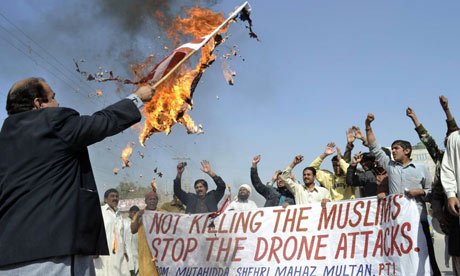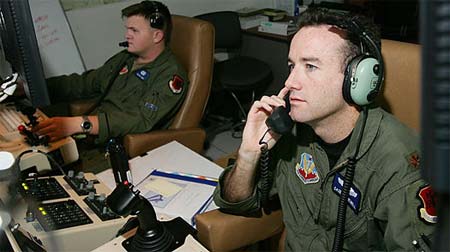Tag: drones
Obama's drone wars and the normalisation of extrajudicial murder
The Guardian, Monday 11 June 2012
Executive privilege has seduced the president into a reckless ‘kill first, ask questions later’ policy that explodes the US constitution
by Michael Boyle

As a candidate, Obama also promised to restore proper legislative and judicial oversight to counterterrorism operations. Rather than treat counterterrorism policy as an area of exception, operating without the normal safeguards that protect the rights of the accused, Obama promised that his approach “will again set an example for the world that the law is not subject to the whims of stubborn rulers, and that?justice is not arbitrary.”
Four years later, it is clear that President Obama has delivered a very different counterterrorism policy from that which he promised on the campaign trail. (Full disclosure: I was an adviser on the Obama campaign’s counterterrorism expert group from July 2007-November 2008.) In fairness, he?has?delivered on a few of his promises, including closing the CIA-run “black site” prisons abroad and ordering that interrogations of all suspects be conducted according to the US army field manual, which proscribes?many of the tactics widely considered torture. And some failures were not wholly his own: Obama’s inability to close Guant?namo Bay was due more to congressional opposition and to an array of legal obstacles than to his own lack of initiative. Continue reading “Obama's drone wars and the normalisation of extrajudicial murder”
India in Afghanistan, Nation building or proxy war?
Subscribe to ShahidulNews
![]()
At a time when Bangladesh is being asked (against the wishes of its citizens) to send troops to Afghanistan, an interesting article on the complex forces that are at play in the region.
related article: Sitting on a man’s back
By MATTHIEU AIKINS
Published1 October 2010
CARAVAN
Matthieu Aikins is a journalist whose feature writing and photography have appeared in such US, Canadian, British and Indian publications as Harper’s Magazine, the Globe & Mail, the National Post, the Coast, the Toronto Sun, The Caravan, Progress Magazine, the Halifax Chronicle-Herald, the Kingston Whig-Standard, Bad Idea Magazine, SAIL Magazine, and on CBC’s ‘The National’ and Global TV’s ‘National News’.
THEY WERE BOTH YOUNG. One had just the first wisps of hair on his cheeks, like an adolescent. The other was not much older, his short-trimmed beard caked with dried blood. There were gaping exit wounds in his shoulder, and in the pale skin of his belly, where his undershirt had been pulled up to reveal the damage. The two boys were lying dead amongst scattered bricks, at the feet of a crowd of gaping onlookers and journalists, in an abandoned construction site in Kabul.
?Where do you think they?re from?? a reporter asked the policeman who was taking a picture of the bodies with his cell phone, his assault rifle dangling from his other hand. The glaze of adrenaline still shone on the cop?s cheeks and eyes. ?Pakistan,? he said. ?Definitely not Afghans.? They always say that here, as if you could tell. They looked like Pashtuns, at least.
It was just one of several attacks in Kabul this summer, unremarkable in its execution and impact, but as a result, a series of extraordinary events had been triggered that would serve as a bellwether of India?s waning influence in Afghanistan. It was 29 May, the first day of the National Consultative Peace Jirga, and the two militants had managed to set up in the empty site and fire rockets at the Polytechnic University, the site of the peace jirga?a carefully stage-managed event that had brought handpicked tribal elders and civil society figures to endorse President Hamid Karzai?s plan to reconcile with the Taliban.
Karzai was furious that the jirga had been disrupted, in the middle of his inaugural speech, no less. One of the rockets had severed the leg of one of his personal bodyguards, and the two attackers had held out for several hours in a gun battle with police before finally being shot to death.
The following week, Karzai called a meeting with Hanif Atmar, the Minister of the Interior, and Amrullah Saleh, the chief of the National Directorate of Security (NDS)? the Afghan intelligence service?where he accused them of deliberately failing to provide adequate security in order to undermine the jirga. In a heated exchange, both offered their resignations. It wasn?t the first time that either of them had offered their resignations in response to an angry outburst by Karzai, but this time the president accepted.
Continue reading “India in Afghanistan, Nation building or proxy war?”
IMPERIAL COWARDICE: Remote control killing in Pakistan
by?Rahnuma Ahmed

If Smedley Butler was living, he?d probably have agreed with Peter Ustinov the playwright, who said recently, ?Terrorism is the war of the poor, and war is the terrorism of the rich.?
IN HIS recent West Point speech, US president Barack Obama announced his decision to send 30,000 more troops to Afghanistan, to fight al-Qaeda which had attacked the US on September 11th (in the words of Bush, it was a ?faceless? and ?cowardly? act), and is now operating in the border region of Afghanistan and Pakistan. (Even though al-Qaeda?s members are now, according to James Jones, his national security adviser, as few as 100).
What Obama did not mention was another decision that was taken to ?parallel? the troop surge in Afghanistan: an expansion in the CIA-led killer drone campaign in Pakistan. An act which will lead to more drone strikes against militants. More US spies in Pakistan. An increased CIA budget for its operations. And thereby, more of what critics term, ?push-button? executions. A state of affairs where the US administration is, Guantanamo-style, judge, jury, executioner ? all in one. These executions, or targeted assassinations, or extrajudicial killings are not executions, or targeted assassinations, or extrajudicial killings. The war on terror has changed all that. Terrorists are no longer criminals. They are combatants. Killing them is part of warfare. And the globe is the battlefield.
In a recent New Yorker magazine article and in several interviews, Jane Mayer who has extensively researched on Predator drones informs us, there are two drone programmes, one is part of the US military-run programme, the other, is run by the CIA. The former, she says, is carried out transparently. There are after-action reports, there is a chain of command. But the CIA?s drone campaign is a ?secret targeted-killing program?, one that is executed in places where the US is not at war. ?It?s a whole new frontier in the use of force.? We don?t know, she says, who is on the target list? How do you get on the list? Can you get off the list? Who makes the list? And, eerily, Where is the battlefield? Where does the battlefield end?
President Obama had promised ?change?, and there has been change in the drone attacks. In its first ten months his administration carried out as many drone attacks as did the Bush administration in its last three years. Drone strikes are a new hot favourite in US ruling circles for not ?risking a single American soldier on the ground? (Reuters), and less collateral damage than from an F-16. CIA director Leon E Panetta has called them ?the only game in town.? But reliable information on casualties is difficult to assess since the Zardari government does not allow anyone, neither journalists, nor aid groups into the area. According to a recently released New America study, ?Since 2006, our analysis indicates, 82 U.S. drone attacks in Pakistan have killed between 750 and 1,000 people. Among them were about 20 leaders of Al Qaeda, the Taliban, and allied groups, all of whom have been killed since January 2008.? The rest of those killed? Footsoldiers in the militant organisations, or civilians.
Piloting a drone requires much less talent or experience than piloting a real plane. It is more like doing well in ?a video game?, and is work that has been outsourced by the CIA to civilians, to those who are not even US government employees. While sitting at CIA headquarters in Langley (Virginia), a drone pilot can view and hone in on a target tens of thousands of miles away. Someone like, for instance, Baitullah Mehsud, the Taliban leader in Pakistan, who was killed in a drone assassination on August 5th this year. Live video feed captured by the infrared camera of an undetected Predator drone hovering two miles away had relayed close-up footage of Mehsud reclining on the rooftop of his father-in-law?s house, in Zanghara (South Waziristan), on a hot summer night. The CIA remotely launched two Hellfire missiles from the Predator. ?After the dust cloud dissipated, all that remained of Mehsud was a detached torso. Eleven others died: his wife, his father-in-law, his mother-in-law, a lieutenant, and seven bodyguards.?
But Mehsud ? targeted and assassinated to elicit the Zardari government?s support for these incursions into Pakistan?s sovereignty ? had not been an easy shoot. Mayer tells us, success came only after 16 strikes had been carried out over a period of 14 months, killing a total of 538 persons, of whom 200-300 were bystanders.
But who cares for native deaths? The less the (American) body bags, the less the (American) blood spilled, the more likely the public acceptance of war. As for the drone pilots, as former congressperson for New York, James Walsh (R) had said ecstatically, it allows them to be ?literally fighting a war in Iraq and at the end of their shift be playing with their kids in Camillus.?
And, why not? Who says ?gangster capitalism? contradicts with Western family values?
?Everything is permitted?
HONOUR and war are said to be inseparable.
I think, no longer. Virtual war is cowardly. For, as John Berger reminds us, there has never been a war in which disparity?the inequality of firepower?has been greater. On the one hand, satellite surveillance night and day, B52s, Tomahawk missiles, cluster bombs, shells with depleted uranium, computerised weapons. And increasingly, one sees the American dream materialise, a ?no-contact war?. On the other, sandbags, elderly men brandishing the pistols of their youth, wearing torn shirts and sneakers, armed with a few Kalashnikovs.
What courage does the American warrior show through pushing his joystick while sitting in Langley? Should not the Medal of Honour be disbanded? Or better still, re-named Medal of Cowardice? For remote-control killings? Killings best-described in George Bush?s words, as ?faceless? acts?
And what about those who decide? Those who push the bigger joystick? In Shakespeare?s plays, says Stephen Greenblatt, the ruler serves as a model and a test case. ?If his actions go unpunished, then, to paraphrase Dostoevsky, everything is permitted.?
Has everything already become permitted? For, as Macbeth had said, ?I am in blood; stepp?d insofar that, should I wade no more, returning were as tedious as to go o?er.?
First published in New Age on 7th December 2009


